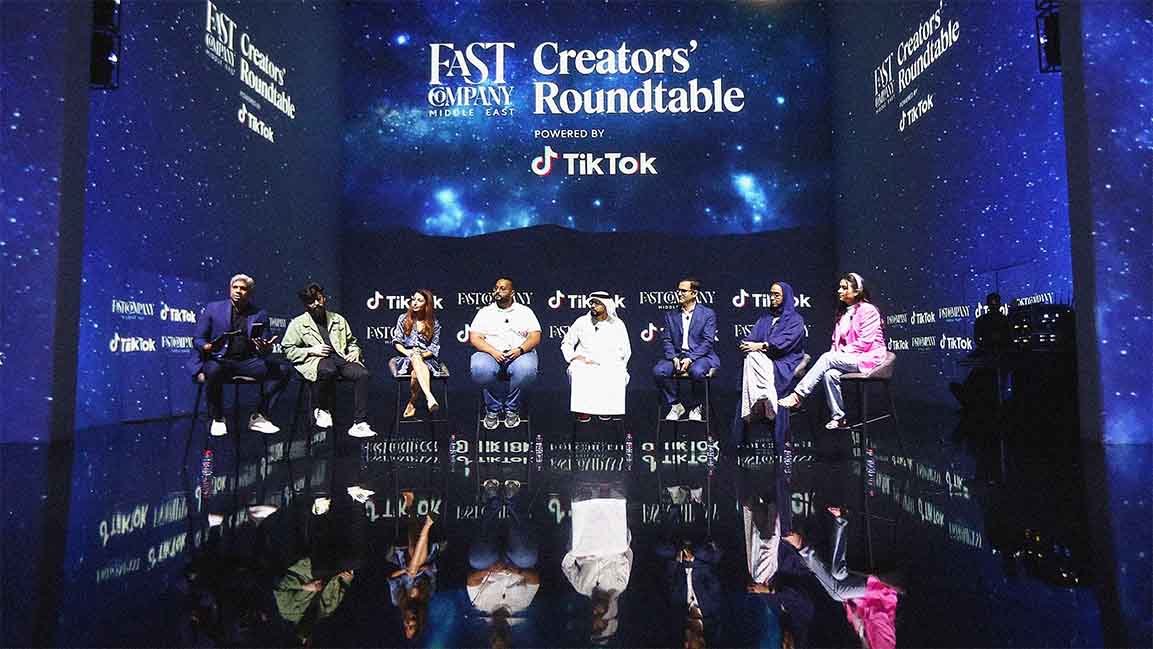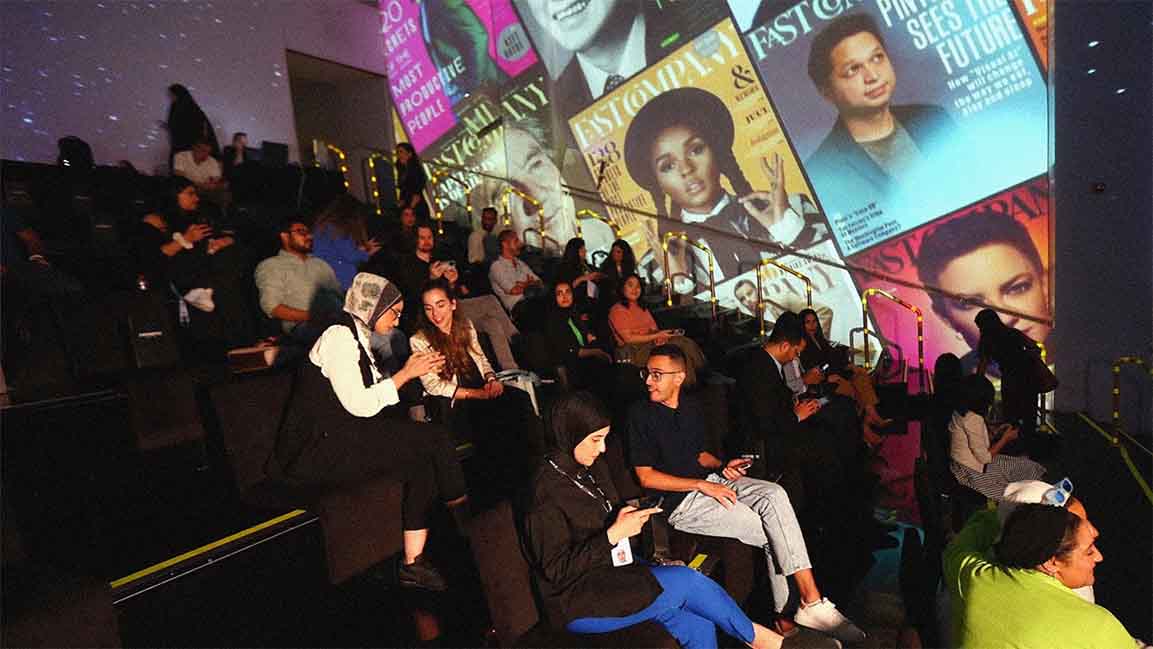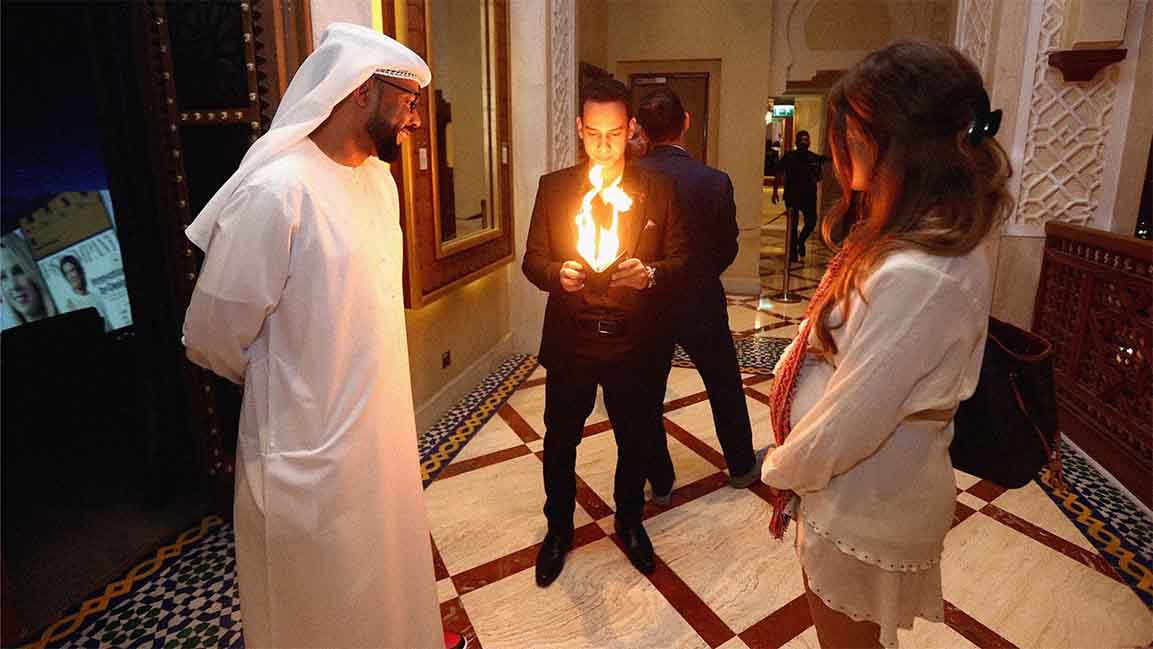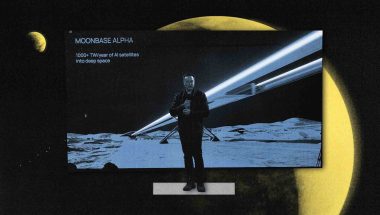- | 3:36 pm
There’s a creative renaissance being led by creators – not influencers
At the Creators’ Roundtable, experts and creators acknowledged the importance of advocacy and sustainable ecosystems to unlock the full potential of the creator economy.

There seems to be only one subject on most people’s lips: the creator economy – ranging from giving content creators autonomy to how brands can get in on it too. As the creator economy continues to grow, the evolution of content creation is seeing a paradigm shift, often marked by a dichotomy. While brands are reducing their marketing budgets, social media creators are grappling with challenges in monetizing their content.
To understand how the creator economy will look like in the future, Fast Company Creators’ Roundtable, in collaboration with TikTok, brought together creators and experts at the Theatre of Digital Art in Dubai to share insights on key challenges – striking the right balance between passion and impact, establishing a sustainable business model, and monetizing with meaningful brands.
Led by Ravi Raman, publisher and editorial director of Fast Company Middle East, the panel explored the potential of harnessing the bustling creator economy in the Middle East.
CREATIVITY AND INTEGRITY
The freewheeling conversation started with creators expressing their challenges, including audience acquisition, monetization tools, and industry partnerships. It resonated with surveys that found the most significant challenges creators face are authenticity, monetization, credibility, and impact.
Yara Aziz, who has 5.2 million followers on TikTok, emphasized the importance of establishing a personal connection with her audience. “One of the first challenges I faced was striking a personal connection with my audience. I gained a loyal following by engaging with them in conversations about various topics.
She also noted that maintaining a brand-friendly, positive, and consistent content approach has helped her monetize her content, adding that the true secret to success lies in “being yourself.”
Mohammad Tarek, a comic creator with 4.7 million TikTok followers, echoed Yara’s sentiment. He said, “You have to be genuine with your audience for them to fall in love with you. When I started making videos, I focused on sharing what makes me laugh and brings me joy, and that’s what I presented to the audience. They could relate to my content because of its authenticity.”
Tarek further explained that brands recognized and appreciated his approach of being friendly and discussing various aspects of life, which led to their trust in him.
While creators are becoming more diversified in their revenue streams, Ahmed Al Nasheet, a Bahraini content creator with 1.2 million TikTok followers, pointed out a common pitfall among creators. “Most creators make content solely to monetize, which, in my opinion, will be detrimental to them. When the money stops, so does their content, growth, and ability to build a genuine connection with their audience. Content should be created for creativity, and monetization should come later.”

Audiences engaged in a variety of surveys at the event.
Authenticity in content creation is intertwined with the creator. “Each content creator brings a part of themselves to their content—part of their personality and passion. From there, they should focus on building their business around it,” added Al Nasheet.
Consistency is important to establish a publishing cadence. Speaking on how to develop a loyal fanbase, Kinda Ibrahim, GM of Operations and Marketing – Middle East, Turkey, Africa, and Pakistan at Tiktok, said, “Think about what you want to achieve, be authentic, know your brand, embrace what makes you special. If you have a mission statement, be it making someone laugh, think of it while creating content. Lean into the community you’re reaching out to and add your twist to it, so the community can welcome you with open arms, enabling you to start developing a loyal fanbase who anticipate your content.”
DRIVING IMPACT FOR BIG RETURNS
While brands have been aligning with content creators for years to help them make a statement on social media, it’s only recently that most brands have discovered the necessity of working with creators. Shant Oknayan, Head of Global Business Solutions – Asia-Pacific, Middle East, Africa & Central Asia at TikTok, pointed it out, said, “It drives business impact for the brands. Brands collaborating with creators are solving for effectiveness. It boils down to the fact that creators drive favorability and trust.”
According to Oknayan, creator-led activations hold greater power compared to brand-led initiatives. He outlined three key reasons supporting this claim – authenticity, trust, and participation. “Brands collaborating with creators to leverage passion instead of popularity become more successful. The brand story is the brand’s to tell, but the tone of voice through the creator drives incremental business impact.”
Another speaker at the Creators’ Roundtable, Aida Al Busaidy, Associate VP of Consumer Advocacy at Dubai Economy and Tourism, underscored the importance of establishing the right policies, procedures, and products for sustaining a business. Reflecting on Dubai’s potential as a backdrop for compelling content, she highlighted the need for a level of advocacy to complement the city’s attributes.
Globally, the creator economy encompasses 50 million creators and generates a combined revenue of over $104 billion. Al Busaidy raised a critical question: “What is our percentage of this share? This is what we need to take a look at right now.”
Meanwhile, Saeed Alnofeli, Director at in5, stressed the importance of creating a sustainable ecosystem. Drawing from his experience working with technology enthusiasts and creators, he said, “What I’ve noticed over the years of working with tech nerds is that they are obsessed with making money and selling their business. But they are gifted with content. Something is lacking on the business side for them.” He stressed the need for education and collaborative opportunities that enable brands and creators to leverage their strengths for monetization.
“There’s a bit of a creative renaissance being led by creators – not influencers, who are passionate about their art, and with a platform like TikTok that helps to amplify it – that should be celebrated,” said Oknayan. As brands lean into that, they must ask themselves, “How must I also be creative and resonate with communities as opposed to just trying to drive advertising,” he added.
The discussion highlighted the crucial role of brand-creator collaboration in driving business impact, emphasizing authenticity, trust, and participation as key factors. Additionally, the panel acknowledged the importance of advocacy, sustainable ecosystems, and bridging the gap between content creation and business expertise to unlock the full potential of the creator economy.

Guests were entertained by illusionist James More.







































